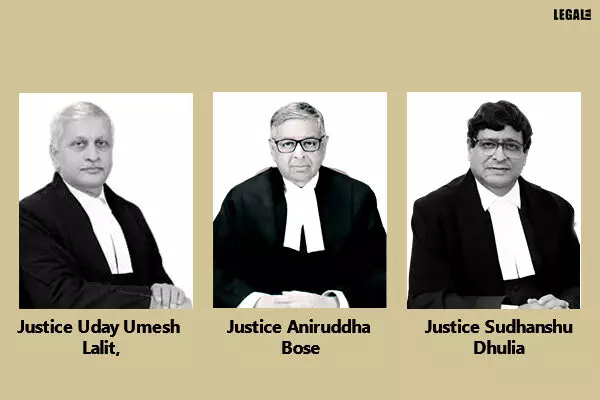- Home
- News
- Articles+
- Aerospace
- Artificial Intelligence
- Agriculture
- Alternate Dispute Resolution
- Arbitration & Mediation
- Banking and Finance
- Bankruptcy
- Book Review
- Bribery & Corruption
- Commercial Litigation
- Competition Law
- Conference Reports
- Consumer Products
- Contract
- Corporate Governance
- Corporate Law
- Covid-19
- Cryptocurrency
- Cybersecurity
- Data Protection
- Defence
- Digital Economy
- E-commerce
- Employment Law
- Energy and Natural Resources
- Entertainment and Sports Law
- Environmental Law
- Environmental, Social, and Governance
- Foreign Direct Investment
- Food and Beverage
- Gaming
- Health Care
- IBC Diaries
- In Focus
- Inclusion & Diversity
- Insurance Law
- Intellectual Property
- International Law
- IP & Tech Era
- Know the Law
- Labour Laws
- Law & Policy and Regulation
- Litigation
- Litigation Funding
- Manufacturing
- Mergers & Acquisitions
- NFTs
- Privacy
- Private Equity
- Project Finance
- Real Estate
- Risk and Compliance
- Student Corner
- Take On Board
- Tax
- Technology Media and Telecom
- Tributes
- Viewpoint
- Zoom In
- Law Firms
- In-House
- Rankings
- E-Magazine
- Legal Era TV
- Events
- Middle East
- Africa
- News
- Articles
- Aerospace
- Artificial Intelligence
- Agriculture
- Alternate Dispute Resolution
- Arbitration & Mediation
- Banking and Finance
- Bankruptcy
- Book Review
- Bribery & Corruption
- Commercial Litigation
- Competition Law
- Conference Reports
- Consumer Products
- Contract
- Corporate Governance
- Corporate Law
- Covid-19
- Cryptocurrency
- Cybersecurity
- Data Protection
- Defence
- Digital Economy
- E-commerce
- Employment Law
- Energy and Natural Resources
- Entertainment and Sports Law
- Environmental Law
- Environmental, Social, and Governance
- Foreign Direct Investment
- Food and Beverage
- Gaming
- Health Care
- IBC Diaries
- In Focus
- Inclusion & Diversity
- Insurance Law
- Intellectual Property
- International Law
- IP & Tech Era
- Know the Law
- Labour Laws
- Law & Policy and Regulation
- Litigation
- Litigation Funding
- Manufacturing
- Mergers & Acquisitions
- NFTs
- Privacy
- Private Equity
- Project Finance
- Real Estate
- Risk and Compliance
- Student Corner
- Take On Board
- Tax
- Technology Media and Telecom
- Tributes
- Viewpoint
- Zoom In
- Law Firms
- In-House
- Rankings
- E-Magazine
- Legal Era TV
- Events
- Middle East
- Africa
Supreme Court reserves judgement on appeal filed by EPFO

Supreme Court reserves judgement on appeal filed by EPFO
A 3-judge bench comprising Justices Uday Umesh Lalit, Aniruddha Bose and Sudhanshu Dhulia reserved judgment after 6-days of hearing.
In an appeal filed by the Employees Provident Fund Organization challenging the Kerala, Rajasthan and Delhi High Court judgments which had quashed the Employee's Pension (Amendment) Scheme, 2014, the Supreme Court has reserved judgement.
The facts of the case are that in 2018, while setting aside the Employee's Pension (Amendment) Scheme, 2014 [2014 Amendment Scheme], the Kerala High Court allowed paying pension proportionate to the salary above the threshold limit of Rs.15,000 per month. Additionally, the High Court also held that there can be no cut-off date for joining the pension scheme.
Pursuant to the above mentioned judgment, the EPFO filed a Special Leave Petition (SLP) against the Kerala High Court judgement. However in 2019 the SLP was dismissed by the Supreme Court. Later, in review sought by the EPFO and the Union Government, the dismissal of the SLP was recalled and the matter was re-opened for hearing on merits.
In August 2021, a 2-judge bench of the Supreme Court had referred the appeals to a 3-judge bench to consider the following issues:
1. Whether there would be a cut-off date under paragraph 11(3) of the Employees' Pension Scheme and
2. Whether the decision in R.C. Gupta v. Regional Provident Fund Commissioner (2016) would be the governing principle on the basis of which all these matters must be disposed.
It was argued by the EPFO that the Pension Fund and the Provident Fund are distinct and the membership in the latter will not automatically translate into a membership of the former. It was further submitted that Pension Scheme is intended for low-age employees and if the persons drawing salaries above the cut-off limit are allowed to draw pension as well, it will create huge imbalance within the fund. The 2014 amendments were brought to address the issue of cross-subsidization between the pension and provident funds.
The pensioners disputed the argument of financial burden raised by the EPFO. It was argued by them that the corpus fund remains intact and the payments have been made from the interest. The pensioners also disputed the argument of the EPFO that there has to be separate option exercised within the cut-off period to join the pension scheme and contended that the stand of the EPFO is contrary to the statute.



